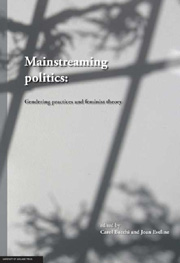Book contents
- Frontmatter
- Contents
- Preface
- Personal reflection
- Publisher's note
- List of authors and project personnel
- Acknowledgements
- Introduction
- 1 Gender/ing impact assessment: Can it be made to work?
- 2 Mainstreaming and neoliberalism: A contested relationship
- 3 Gender analysis and social change: Testing the water
- 4 What are we mainstreaming when we mainstream gender?
- 5 Approaches to gender mainstreaming: What's the problem represented to be?
- 6 Power, resistance and reflexive practice
- 7 Gender mainstreaming: The answer to the gender pay gap?
- 8 Gender analysis and community participation: The role of women's policy units
- 9 The invisibility of gendered power relations in domestic violence policy
- 10 Gender mainstreaming versus diversity mainstreaming: Methodology as emancipatory politics
- 11 University-public sector research collaboration: Mine the space, never mind the gap
- 12 Obeying organisational ‘rules of relevance’: Gender analysis of policy
- 13 Gender mainstreaming or diversity mainstreaming? The politics of ‘doing’
- Conclusion A politics of movement
- Author Index
- General Index
13 - Gender mainstreaming or diversity mainstreaming? The politics of ‘doing’
Published online by Cambridge University Press: 05 June 2012
- Frontmatter
- Contents
- Preface
- Personal reflection
- Publisher's note
- List of authors and project personnel
- Acknowledgements
- Introduction
- 1 Gender/ing impact assessment: Can it be made to work?
- 2 Mainstreaming and neoliberalism: A contested relationship
- 3 Gender analysis and social change: Testing the water
- 4 What are we mainstreaming when we mainstream gender?
- 5 Approaches to gender mainstreaming: What's the problem represented to be?
- 6 Power, resistance and reflexive practice
- 7 Gender mainstreaming: The answer to the gender pay gap?
- 8 Gender analysis and community participation: The role of women's policy units
- 9 The invisibility of gendered power relations in domestic violence policy
- 10 Gender mainstreaming versus diversity mainstreaming: Methodology as emancipatory politics
- 11 University-public sector research collaboration: Mine the space, never mind the gap
- 12 Obeying organisational ‘rules of relevance’: Gender analysis of policy
- 13 Gender mainstreaming or diversity mainstreaming? The politics of ‘doing’
- Conclusion A politics of movement
- Author Index
- General Index
Summary
Introduction: Carol Bacchi and Joan Eveline
This chapter applies the concept of ‘doing’ to the practices of feminist researchers. Under scrutiny are the ways in which unexamined presumptions about the main business of gender mainstreaming as gender equality foreclose consideration of the lives and experiences of specific groups of women, here Aboriginal and Torres Strait Islander women. Following from Chapters 10, 11 and 12, the chapter emphasises the critical importance of collaborative spaces to the character and shape of egalitarian politics.
The chapter highlights the continuing dispute in feminist communities about whether or not the term ‘diversity mainstreaming’ better reflects current sensitivities to differences among women, commonly described as an ‘intersectional’ sensitivity. It shows how the South Australian research team in the Gender Analysis Project dealt with this issue, deciding to include ‘race and cultural analysis’ within a gender analysis guide (SAGA).
This decision, as we describe, was not, as might first appear, a compromise position. Rather, non-Aboriginal members of the group accepted that Aboriginal women were best placed to articulate a political vision of use to their communities – a vision based on the identity of those communities. This acceptance compelled those non-Aboriginal members to rethink assumptions about the obviousness of gender as an analytical priority. This rethinking is an outcome of what we describe in the book as the process of reflexivity – finding ways to reflect critically on one's own starting points for thinking (all the while recognising that there are no agentic subjects who can invariably avoid traps of discursive positioning).
- Type
- Chapter
- Information
- Mainstreaming PoliticsGendering Practices and Feminist Theory, pp. 311 - 334Publisher: The University of Adelaide PressPrint publication year: 2010
- 1
- Cited by

